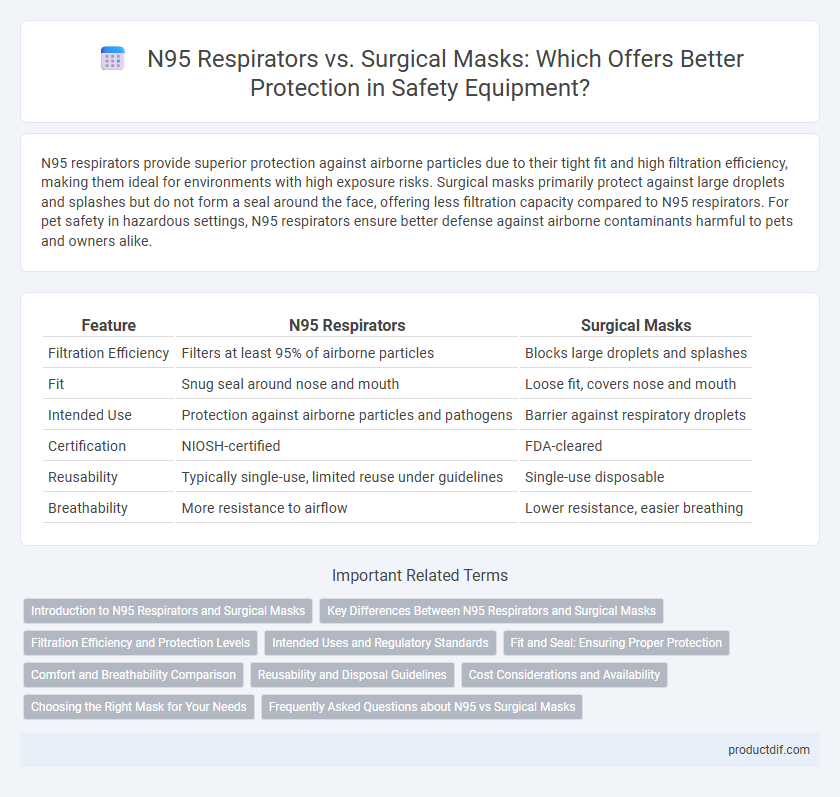N95 respirators provide superior protection against airborne particles due to their tight fit and high filtration efficiency, making them ideal for environments with high exposure risks. Surgical masks primarily protect against large droplets and splashes but do not form a seal around the face, offering less filtration capacity compared to N95 respirators. For pet safety in hazardous settings, N95 respirators ensure better defense against airborne contaminants harmful to pets and owners alike.
Table of Comparison
| Feature | N95 Respirators | Surgical Masks |
|---|---|---|
| Filtration Efficiency | Filters at least 95% of airborne particles | Blocks large droplets and splashes |
| Fit | Snug seal around nose and mouth | Loose fit, covers nose and mouth |
| Intended Use | Protection against airborne particles and pathogens | Barrier against respiratory droplets |
| Certification | NIOSH-certified | FDA-cleared |
| Reusability | Typically single-use, limited reuse under guidelines | Single-use disposable |
| Breathability | More resistance to airflow | Lower resistance, easier breathing |
Introduction to N95 Respirators and Surgical Masks
N95 respirators are tight-fitting respiratory protective devices designed to filter at least 95% of airborne particles, including large respiratory droplets and smaller aerosols, offering a higher level of protection compared to surgical masks. Surgical masks are loose-fitting, disposable devices primarily intended to block large-particle droplets, splashes, sprays, or splatter that may contain germs, protecting both the wearer and others. Understanding the specific filtration capabilities and intended use environments of N95 respirators versus surgical masks is essential for selecting appropriate personal protective equipment in healthcare and hazardous settings.
Key Differences Between N95 Respirators and Surgical Masks
N95 respirators provide a higher level of protection by filtering out at least 95% of airborne particles, including small aerosols and droplets, whereas surgical masks primarily block large respiratory droplets and splashes. N95 respirators are designed to form a tight seal around the nose and mouth, minimizing leakage, while surgical masks offer a looser fit without sealing gaps. The filtration efficiency, fit, and intended use in healthcare settings are the primary distinctions influencing the choice between N95 respirators and surgical masks for protection against airborne contaminants.
Filtration Efficiency and Protection Levels
N95 respirators provide a filtration efficiency of at least 95% against airborne particles including viruses and bacteria, offering superior protection compared to surgical masks. Surgical masks typically filter large droplets and splashes but do not effectively filter smaller airborne particles, resulting in lower overall protection. The tight facial fit of N95 respirators ensures minimal leakage, enhancing their ability to protect against airborne contaminants in healthcare and hazardous environments.
Intended Uses and Regulatory Standards
N95 respirators are designed to achieve a close facial fit and efficient filtration of airborne particles, protecting against both large respiratory droplets and smaller aerosolized particles, and are regulated by NIOSH under 42 CFR Part 84 standards. Surgical masks primarily protect against large droplets and splashes, serving as a barrier to prevent the wearer from spreading infections, with regulatory approval from the FDA under 21 CFR 878.4040. N95 respirators are essential in high-risk healthcare settings requiring airborne infection isolation, while surgical masks are suitable for general patient care and source control in lower-risk environments.
Fit and Seal: Ensuring Proper Protection
N95 respirators provide a tighter fit and superior seal compared to surgical masks, reducing the risk of airborne particle inhalation. Their design includes an adjustable nose clip and elastic headbands that create a secure seal around the face, minimizing gaps. Surgical masks mainly protect against large droplets but lack the effective seal needed to prevent airborne contaminants from entering.
Comfort and Breathability Comparison
N95 respirators typically provide a tighter seal and higher filtration efficiency but may cause increased breathing resistance and heat buildup, impacting comfort during extended use. Surgical masks offer greater breathability with a looser fit, which generally enhances comfort but reduces protection against airborne particles. Choosing between N95 and surgical masks depends on balancing the need for respiratory protection with the wearer's comfort and breathability preferences.
Reusability and Disposal Guidelines
N95 respirators offer superior filtration efficiency and are designed for limited reuse under strict protocols, including proper storage and fit checks between uses to maintain safety. Surgical masks are primarily single-use, requiring disposal after each wear to prevent contamination and ensure hygiene. Proper disposal involves placing used masks in designated biohazard containers to minimize environmental and health risks.
Cost Considerations and Availability
N95 respirators generally cost more than surgical masks due to their advanced filtration technology and certification standards. Availability of N95 masks can be limited during high-demand periods, often leading to supply shortages and increased prices. Surgical masks are more widely available and cost-effective, making them a practical option for general use in healthcare and community settings.
Choosing the Right Mask for Your Needs
N95 respirators provide superior protection by filtering at least 95% of airborne particles, making them ideal for high-risk environments requiring respiratory protection from viruses and fine dust. Surgical masks primarily protect against large droplets and splashes, suitable for general public use and preventing the spread of respiratory infections. Selecting the right mask depends on exposure risk, with N95 respirators recommended for healthcare workers and surgical masks for everyday activities and lower-risk settings.
Frequently Asked Questions about N95 vs Surgical Masks
N95 respirators provide a higher level of filtration efficiency, capturing at least 95% of airborne particles, including viruses and bacteria, whereas surgical masks primarily protect against large droplets and splashes. Frequently asked questions highlight the difference in fit, with N95s offering a tighter seal to the face, essential for preventing airborne transmission in healthcare settings. Users often inquire about reusability, and while surgical masks are typically disposable after single use, certain N95 models can be reused following proper decontamination protocols.
N95 respirators vs Surgical masks Infographic

 productdif.com
productdif.com